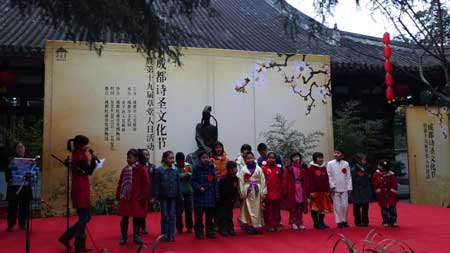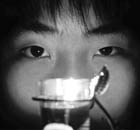Culture Tourism
Young poets perform at museum
By Huang Zhiling and Chen Tao (China Daily Sichuan Bureau)
Updated: 2010-02-22 18:03
 |
Large Medium Small |
CHENGDU: Visitors to the Du Fu Thatched Cottage Museum in this capital of southwestern China's Sichuan Province on Wednesday were impressed with the following household lines by Du Fu (712-770AD), one of the greater Chinese poets:
Two golden orioles sing amid the willows green;
A row of white egrets fly into the blue sky.
From my window the snow-crowned western hills are seen;
Beyond the door the east-bound ships at anchor lie
|
 All the young poets has a curtain call after their performance on February 20. [Photo/Huang Zhiling] |
"The lines recited by an 8-year-old boy in a poetry recital competition at the museum reminded me of the arrival of spring. The museum abounds in blossoming flowers and green trees when most parts of the country are chilly and barren," a visitor from northwestern China told www.chinadaily.com.cn.
On Wednesday, the Scripture Collection Building at the Du Fu Thatched Cottage Museum was crowded with nearly 50 children participating in a poetry recital competition.
"The competition was aimed at choosing the best young poets who could recite poems by Du Fu or other ancient poets during the 15-day Spring Festival that started on Feb 14," said Wang Fei, deputy curator of the Du Fu Thatched Cottage Museum.
Of the nearly 50 children, the youngest were 4 years old and the oldest less than 15. Despite their young age, most memorized lines of poems by Du Fu and other ancient poets.
Huang Leran, a second-grader at Chengdu Paotongshu Primary School, wore a yellow costume representing the Han Dynasty (206BC-220AD).
"Although I can memorize many ancient poems, I have prepared for the competition for several days," he told www.chinadaily.com.cn. Many children skilled at reciting poems also were able to describe the artistic ideas behind the poetry.
Xiong Pu, 11, told a senior reporter with www.newssc.net, the exact meaning of a long poem. Wednesday's competition featured 22 children who participated in the final round in the museum on Thursday to be named one of the top young poets who joined Tan Jihe, famous historian and president of the Sichuan Provincial Association of History, in a memorial ceremony for Du Fu on Feb 20, Wang said. Du Fu Thatched Cottage Museum is dedicated to Du Fu, whose poems are included in many school textbooks.
A native of Gongxian in Central China's Henan Province, Du moved to Chengdu in 759AD to take refuge from a war fought between two rebelling generals that led to the decline of the Tang Dynasty (618-907AD). He lived a peaceful life for about four years in a cottage he built in the western suburbs of the city, writing 240 of his 1,400 poems.
Du's poems are known for sympathetic portrayals of human suffering and bitterness in the face of injustice and corruption.
Today, Du's cottage has become a museum that includes a replica of his thatched cottage. The replica was built in 1997.
The museum has become a center of Chinese literature and visiting it is a must for most first-time visitors to Chengdu. Visitors can enjoy the aura of ancient culture, as well as tranquility in the bamboo groves outside the museum, away from the urban jungle.







